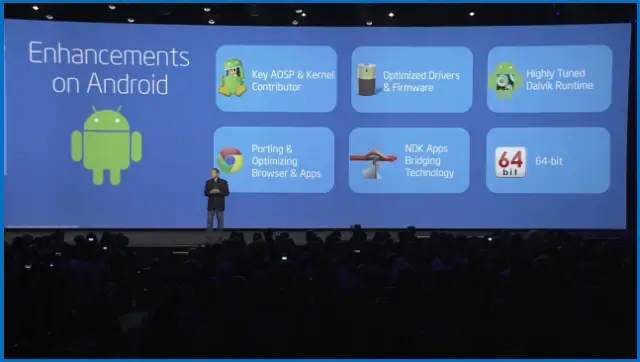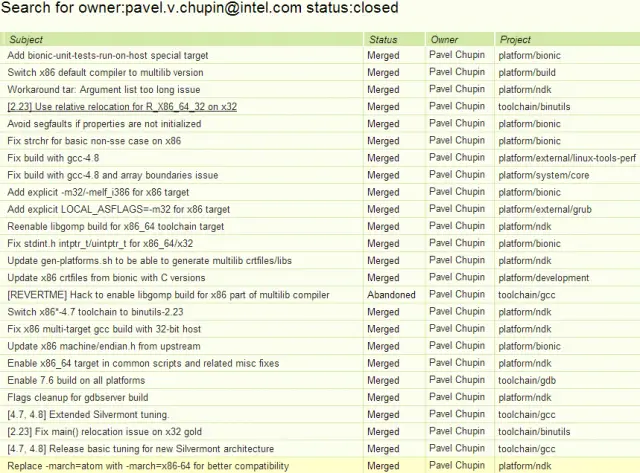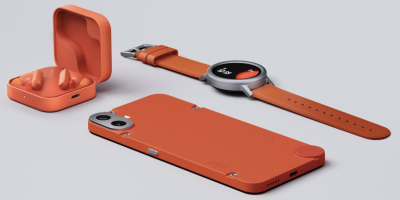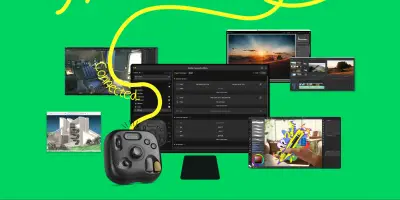
At last week’s Intel Developer Forum in San Francisco, Intel a showed their love for Google in a big way. Google’s Sundar Pichai, Senior Vice President of Android, Chrome, and Apps, even made a guest appearance on stage to give Intel’s Doug Fisher a ‘Noogler hat’ to commemorate their new found partnership. At IDF 2013, Intel announced various enhancements for Android and how they are “going to be adding things like 64-bit capabilities to the platform”.
Wait, you mean 64-bit capabilities like the newly announced iPhone 5S? Kind of, but the reality is a bit more complicated.
Intel announced their Bay Trail platform. Of the processors announced, the Z3000 series will be Intel’s Atom brand processor which competes against other ARM based mobile processors. Depending on the model, they sport either dual or quad cores SoCs. The most powerful SoC announced, the quad core Z3770, will put out clock speeds up to 2.4GHz and support higher screen resolutions of 2,560 x 1,600. Sometime in the first quarter of 2014, Intel plans to release a 64-bit version of Bay Trail SoC.
What’s this mean for Android?
The Bay Trail Z3000 series, is specifically designed for tablets running Android and Windows 8.1. Intel wants their new platform to succeed and is doing everything in their power to make this success a reality on Android.
Intel started off by bragging that they have “been one of the leading contributors to Linux in the market place”. That’s definitely true for Android. They’ve been adding key AOSP commits, Android kernel code, optimizing Android’s Dalvik VM, and tweaking drivers where needed to make sure Android runs the best it can on their new chips. Additionally, Intel’s new NDK will allow Android developers to write C or C++ code for Android apps, which will help boost performance.

Next up, Intel announced that they were “going to be adding things like 64-bit capabilities to the platform”. As previously mentioned, coming in early 2014, Bay Trail will come in the 64-bit flavor. As shown above in multiple locations, Intel has been adding code to the Android Open Source Project in preparation for their upcoming 64-bit chip. In fact, they’ve been doing it for months.
If you’re feelin’ adventurous, you can hit up the source links below to see exactly what changes Intel is making. Just a warning: if you’re not a developer, a lot of it won’t make a whole lot of sense.
Does this mean the Android OS will be 64-bit capable?
Most likely no. Not yet. Intel is just adding support for their upcoming Bay Trail 64-bit SoC. Android can run as a 32-bit operating system on top of a 64-bit capable processor. This has been done for years in the desktop world. When the day comes that Android is in fact 64-bit capable, Intel will most certain be ready.
Assuming Android eventually does become a 64-bit solution, the next hurdle matches the iPhone 5S’ current 64-bit limitations: apps and games need to leverage these capabilities or it’s all for naught.
Additionally, Intel isn’t the only Android OEM looking towards the future, Samsung recently announced that they too would be adding 64-bit capabilities in upcoming phones.
Source: [IDF 2013] [Android Code Review 1, 2]












Will be interesting to see how many years it takes for mobile tech to move to majority 64-bit given the relatively slow adoption of the laptop/desktop ecosystem.
Was gonna ask of what benefit (tangible) this would be to the everyday user.
THX for pointing out what to expect down the road,looking forward to it,been wanting this since the ATRIX/PHOTON/BIONIC & LAPDOCK days……………….
It’s not. The current 32-bit processors are still so overpowered for what 99% of people use their phones and tablets for: Temple Run, Facebook, email, and web browsing.
What about the 1% of people who wish to replace the desktop with tablets and want to do really intense things with it? I want to someday video edit with my tablet.
The UI limits you though. It’s hard to have many options without a mouse and menus.
All “Rendering” (graphics) applications benefit from 64 bit…
HD & XHD video
Video game
Video editing
3D Modeling
Animation
photo editing
vector graphics
Doesn’t renderscript try to offload that stuff onto the GPU?
Currently, for desktop level Graphics Processing on a mobile system, Razor Edge is the only tablet that has a acceptable GPU (both in speed and memory).
Also, 64 bit allows over 4 GB system RAM, which comes in useful for online Video buffering, Flash and Java apps, along with all the previously mentioned benefits.
Totally unnecessary at this juncture of mobile computing.
So we should just wait until it’s too late like what happened with PC’s? Phones will have 4GB of ram within a year or 2, but you won’t get to use it all. It’s much better to start the transition now. Especially since it won’t raise costs at all.
Honestly, I don’t care about 64bit for mobile processing. What I do care about, is Intel. I’m still waiting on that “awesome” processor that makes it into every phone like a snapdragon 800. It’s bound to happen…
You know it’ll run at 75 jiggahertz and use one nanowatt.
and cost $1400+. No doubt on the quality / performance though.
Really? I don’t think I even know of a chip that is that expensive. Generally the $320 i7 3820k is way more than enough for the normal person.
Oh, I was referring to the 75 jiggahertz and 1 nanowatt chip lol. Intel has always been the more premium/expensive one on the desktop though… I’ve seen their high end desktop chips go as high as $2000.
The i7 Extreme Edition (3960X, 3970X, 4960X) processors go for $999.
Geez. Lay off the kool-aid. Intel is still very much behind in the mobile chip maket. They win some CPU benchmarks only because of the Turbo-Boost nonsense which gets activated mostly during benchmarks, but not in real world, and they are still like 2x behind in GPU performance compared to other chips.
Plus, Bay Trail is only a tablet chip. They won’t even have the phone chip available until six months from now, and it will probably be even weaker than Bay Trail.
Maybe, but they are the best with power management. There’s no argument there.
BayTrail running at 2.4 GHz is same like a Snapdragon 800 running at 2.2/2.3 GHz. Both won’t run at full stretch all the time. It’ll run at full speed when needed.
I would argue this is the perfect time to make the transition. 64 bit isn’t just about addressing more memory. It also means more, wider registers and updated instruction sets. The mobile industry has learned from the evolution of the PC – make the transition now, before memory is a constraint.
I always thought 64-bit was useless until you had more than 3-4gb of memory… apparently that’s not true. Wikipedia has more info @ http://en.wikipedia.org/wiki/64-bit_computing under pros & cons.
iPhone, Galaxy… processors by Samsung
I’m still not sure the point of moving to a 64-bit OS system… For our phones? 32-bit is just fine. Maybe someone here can enlighten me on the benefits that actually would be an evolutionary step that can’t be accomplished on a 32-bit OS.
well, nothing evolutionary will ever happen if you just stand still.
But its most basic benefits will be supporting more RAM (32-bit is capped at 4gb) and just being faster in general since it can handle more info simultaneously. But it’s more of a there’s no reason not to go 64-bit, it shouldn’t increase prices or anything.
I guess you’re right… but we need more than 4gbs of ram on our phones?
I would understand the benefits of this for a tablet however… Being able to use it as a laptop (if it has a detachable keyboard) would be awesome. Basically an Asus Transformer on steroids.
I guess only good things can come from Android moving into 64-bit, but if this worked anything like a PC, wouldn’t this mean lack of support from different apps? It may cause more fragmentation for Android.
The 64 bit transition on PC’s was more of a driver issue in the beginning than it was applications. Windows XP x64 is a good example. I was a beta tester and it was awful finding printer drivers and what not. I never had any issues at all running 32 bit programs though.
64bit is not the thing that’s good but when ARM made the new 64-bit standard they knew that it’s not backwards compatible so they did a lot of optimizing of float/integer math and redid how the NEON works.
The cpu still supports 32 bit but its running in legacy mode(VFPv3) and the new v4 extensions are disabled, also they shorted the codepath by 30% in A64 mode and made the NEON registers bigger (32x 128bit) and made it easier for the compiler to target it with a flat model (the neon registers look like 32 128bit registers) added new multiple load/store commands to any register and made more datatypes vectorised and usable in the NEON registers.
All this adds up to a much faster cpu with much much better float/interger performance BUT the 64-bit adds a performance catch, in heavy pointer code (think graph problems, navigation,linked lists etc) the 64-bit pointers fill up the prefetch and lowers performance by up to 25% compared to 32-bit code, you can see this in the Anandtech review of the A7 cpu.
So the ARMv8 does increase performance a lot especially with float/integer math and the new NEON design makes it much easier to target more code to run on it for the compiler but the 64-bit instructions do lower performance by quite a bit in some situations.
For 64 bit Android there is a few catches, the 32bit cpu already supports up to 1TB of ram but a 64-bit cpu supports more than 4GB ram per process (think per app) but since Android limits each app to 256MB (I think) it’s really not a big motivation today.
But the ARMv8 standard is great and it makes a lot of things that are optional today required (NEON and VFPv3/v4) and that is even better!
There are several. The primary IMO is RAM. 32-bit systems are limited to 4GB of RAM. Right now, that is more than enough, but things are moving so fast. I see this as being better for tablets than phones right now.
we might not need 64 bit now but I would one day actually be able to do work on my phone. The vfx and 3d animation industry run on programs that are ram hogs.
Apple has an advantage …. and it’s gone (South Park Meme style, too lazy to make it.)
Considering the fact that a lot of apps are running inside the Dalvik VM, when Android moves to 64-bit a lot of apps will be running inside that 64-bit VM too. So unlike on iOS, not that many apps will need to be updated. Only those using native code with the NDK.
I tell you, it is not 64 bit that we need.. it’s battery life!
Don’t think that this will work with all Bay Trail chips. You actually need to buy a 64-bit Bay Trail, which probably won’t be available until next year. By then other ARM chip makers should come out with 64-bit chips, too.
my Aunty Mia just got a stunning red
Chevrolet Cruze Diesel only from working off a home pc… this post www.JAM20.com
Exemplary features. 64-bit compatibility will certainly enhance the power of Android. Off course, we need to remember that iOS7 has made the asking rate steep for Android. The 64-bit phenomena will certainly excite the companies like inmobi or appnext or admob, who have been constantly feeding the world with newer games and apps
JVM = minimal pain to transition to 64 bit, for apps. Apple was smart to start early, their app upgrade pro. ss will be much harder.
Addressing more than 4gb can be very handy for flash, though we’ll see if anyone chooses to use it that way. Can be useful for virtual memory tricks. Don’t forget about addressing those huge video buffers, too. 64 bit isn’t necessary yet, but we’ll need it soon.
Unless they use native code. If it’s an app that uses the Dalvik VM, then they are set!
precisely. And, due to the “fragmentation issue” native code is minimized, and when it is used, statistically better planned for alternating architectures. than an iOS app. It’s silver lining stuff, but real nonetheless.
Android is 32bit and 32bit running on a 64bit processor is not 64bit, it’s 32bit.
impatiently waits for the android+windows devices
That’s how android moves to the next level: the android desktop
android has alot of work before it’s desktop ready like windows or ubuntu i think…i just like the idea of being able to dual boot them (hopefully) natively, course there’s alot of factors i haven’t looked it on the windows side either
Android has more commercial games than ubuntu. I don’t know if it ever would be good for running 3dmax but I can see it for desktop games, where UI doesn’t apply.
yea like windows/linux for work, android for play type idea, and i think android could be capable of it later on with the proper hardware and software
This better mean the arrival of at least 4GB of ram soon, otherwise useless.
This is Great news, Although Many mobile devices are arm based and that’s been in various Android Repositories for quite a while although not in the AOSP.
This is for x86 ( well x86_64 ) so it probably means intel have some 64 bit SOC’s in the Pipeline. The only device of note running Intel at the moment is the Galaxy Tab 3.
In the Android x86 project we are already running 64bit PAE Kernels with a 32bit Userspace which basically means you don’t have the memory limit normally imposed by the 32Bit Addressing Model. So I can use all 16 Gig on my Desktop machine….. This just puts the icing on the cake really
Trevd
Soon, iPad-like devices will be running the full, 64 bit Windows 8.1 using those new Atom SOCs. You should be able to duel boot Android and Windows for the Full Monty experience, at least until Microsoft gets Windows Phone fully integrated and merged with Windows 8.1 Pro 64 bit. Then, after Intel releases their new 14 nm super chips, you will have your PC in your pocket. This will be the beginning of the Drop-and-Dock era.
Perhaps it may even become the Proximity Dock era – just move near your extended workstations / mobile accessories and your functionality automatically extends without any user effort. In effect, your “phone” becomes your core connection to the outside world.
It is even possible that this device could be placed inside your body, for maximum security and usefulness. How will you interact? Google goggles at first and then contact lenses or corneal implants that can not only display information but track your hand movements. Ear implants will be used for super hearing and to output private sounds, only heard by the user. Interesting that the biggest hurtle is not what most people think. The biggest hurdle is how to power these nano devices. If the power requirements get low enough, simple solar energy and body heat could do the trick. Of course, this is several decades down the road, at least.
x86 is dead Intel needs to die
For mobile, perhaps. But let’s say we’re talking about an android game console. Battery isn’t a factor so when intel cranks up the juice, x86 wins.
Intel x86 is far behind in compatibility in android, where arm is the norm. I have a friend with the first Motorola with an Intel chip and many games are not compatible with x86. He sold his phone because of this. These atom new chips will perform better with windows 8.1. 64 bits is also non sense on mobile currently, more RAM wasted and no app compatibility
x86 is far from dead. Believe it or not, it’s probably going to be a formidable opponent in the mobile world.
Honestly, as much as love Android and my Nexus 7, I would not mind having a 7″ full windows 8.1 tablet with a beefy CPU that’s still capable of good battery life.
Nice post..!!!